The proceedings for Sinn und Bedeutung 21 is out now and available from here. Check out my article on how to derive the discontinuity implicature of past markers in Daakaka and elsewhere!
Linguist
The proceedings for Sinn und Bedeutung 21 is out now and available from here. Check out my article on how to derive the discontinuity implicature of past markers in Daakaka and elsewhere!
This is a very specific problem with Generic Mapping Tools which I didn’t find well documented: if you map certain symbols to a list of coordinates specified in COORDINATES.xy, you can specify that subsets of those coordinates are mapped to symbols in different colors in two ways:
Continue reading “GMT: Changing the color of a symbol within a xy file”
 For my second talk in Konstanz, I discussed my paper on Counterfactuality and Past in the What-if group. You can download the current manuscript version here: [download id=”362″]. My slides can be found here: [download id=”367″].
For my second talk in Konstanz, I discussed my paper on Counterfactuality and Past in the What-if group. You can download the current manuscript version here: [download id=”362″]. My slides can be found here: [download id=”367″].
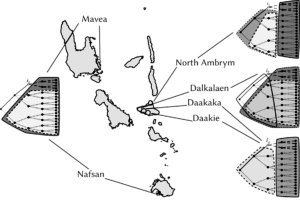 Last week, I had the privilege of giving two talks in Konstanz. In the colloquium of the linguistics department, I talked about our latest research on counterfactual futures in Oceanic and what they tell us about tense and mood in our subject languages. Download the slides here: [download id=”348″]. Read the paper here: [download id=”358″].
Last week, I had the privilege of giving two talks in Konstanz. In the colloquium of the linguistics department, I talked about our latest research on counterfactual futures in Oceanic and what they tell us about tense and mood in our subject languages. Download the slides here: [download id=”348″]. Read the paper here: [download id=”358″].
[download id=”327″] Here is the pdf that I used to produce the storyboard picture books now available at amazon. I have used storyboards both from the Totem Field Storyboards site and storyboards I have produced as part of the MelaTAMP research project. The Daakaka text is a selection of the results from last year’s fieldwork on Ambrym. Enjoy!
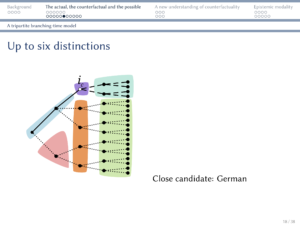 I went to Göttingen last week to talk about modality, which is turning into a pleasant tradition. In my talk, I outlined the typological debate on the irrealis distinction, introduced the tripartite branching-time model that I think will help us the relevant cross-linguistic variation, and discussed how the same approach also sheds new light on some long-standing questions about the nature of modality, counterfactuality and epistemic necessity. You can find the slides here.
I went to Göttingen last week to talk about modality, which is turning into a pleasant tradition. In my talk, I outlined the typological debate on the irrealis distinction, introduced the tripartite branching-time model that I think will help us the relevant cross-linguistic variation, and discussed how the same approach also sheds new light on some long-standing questions about the nature of modality, counterfactuality and epistemic necessity. You can find the slides here.
There was an interesting small workshop in Torun in April on Measuring Linguistic Complexity. When the call came out, I had just finished a preliminary overview on the previous literature on the topic and was ready to get cracking, so I got together with Vera Demberg to test our hypothesis that focussing on POS tags rather than the token-level annotations would give us more reliable results on syntactic flexibility. Our results are in the proceedings.
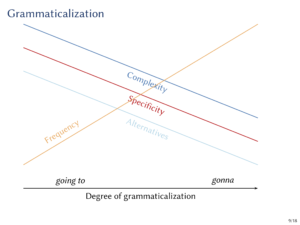 My work in the Collaborative Research Unit on information density (ID) in Saarbrücken has made me think about the relation between grammaticalisation and ID. In an invited talk to Saarbrücken in April, I explored some of my ideas on this topic. You can find the slides here.
My work in the Collaborative Research Unit on information density (ID) in Saarbrücken has made me think about the relation between grammaticalisation and ID. In an invited talk to Saarbrücken in April, I explored some of my ideas on this topic. You can find the slides here.
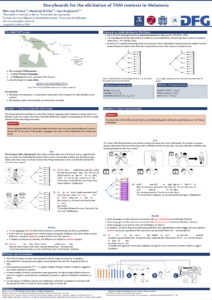 The Linguistic Evidence conference in Tübingen this year is long over and I’m sad I couldn’t be there, but our poster was well represented by my two co-authors, Manfred Krifka and Ana Krajinović. Click here to download the PDF.
The Linguistic Evidence conference in Tübingen this year is long over and I’m sad I couldn’t be there, but our poster was well represented by my two co-authors, Manfred Krifka and Ana Krajinović. Click here to download the PDF.
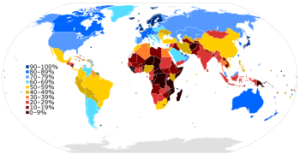 My colleague Stefania Degaetano-Ortlieb and I, with generous support from Elke Teich, organised a workshop last week. We invited researchers from a variety of backgrounds, spanning language documentation, typology, language acquisition, computational linguistics and historical linguistics. We were very happy with the inspiring talks and vibrant discussions about challenges and solutions, which I am sure will continue beyond the small event we had.
My colleague Stefania Degaetano-Ortlieb and I, with generous support from Elke Teich, organised a workshop last week. We invited researchers from a variety of backgrounds, spanning language documentation, typology, language acquisition, computational linguistics and historical linguistics. We were very happy with the inspiring talks and vibrant discussions about challenges and solutions, which I am sure will continue beyond the small event we had.